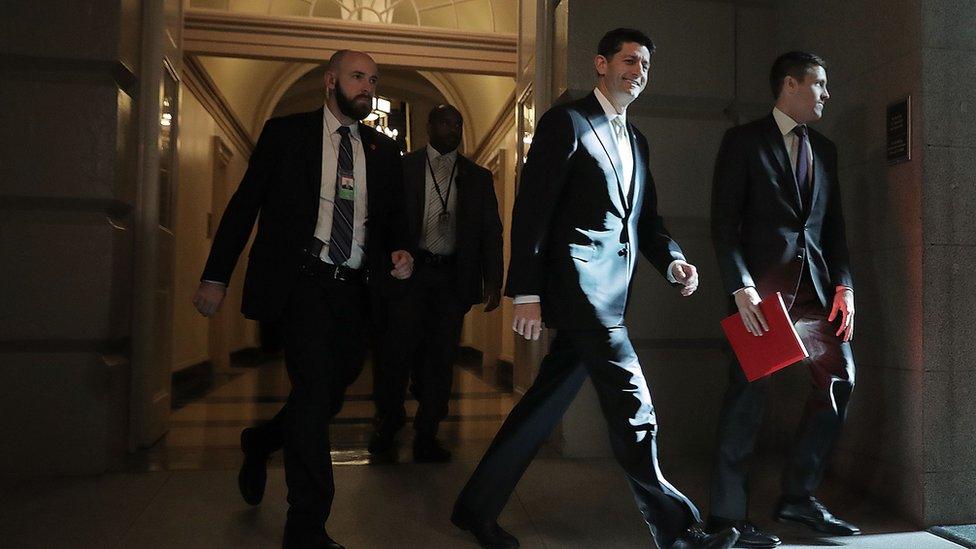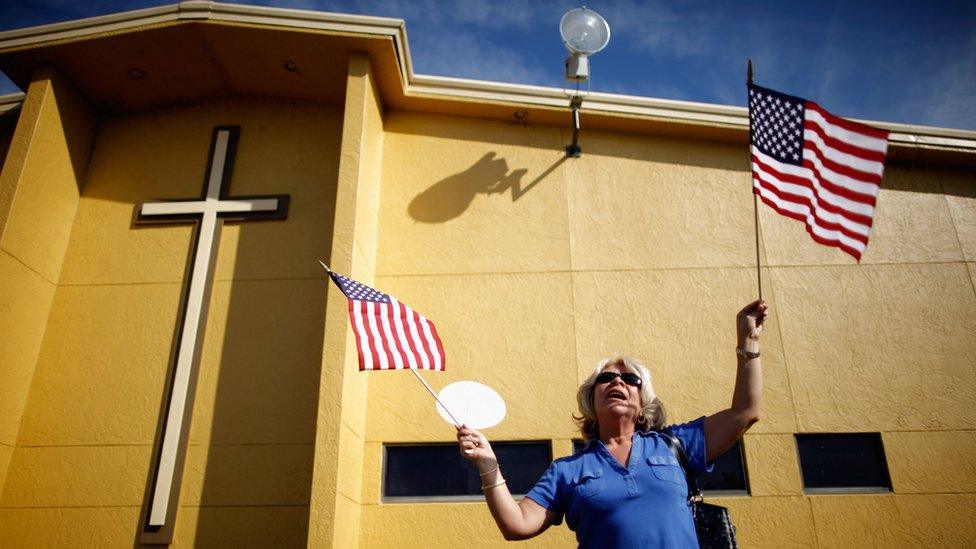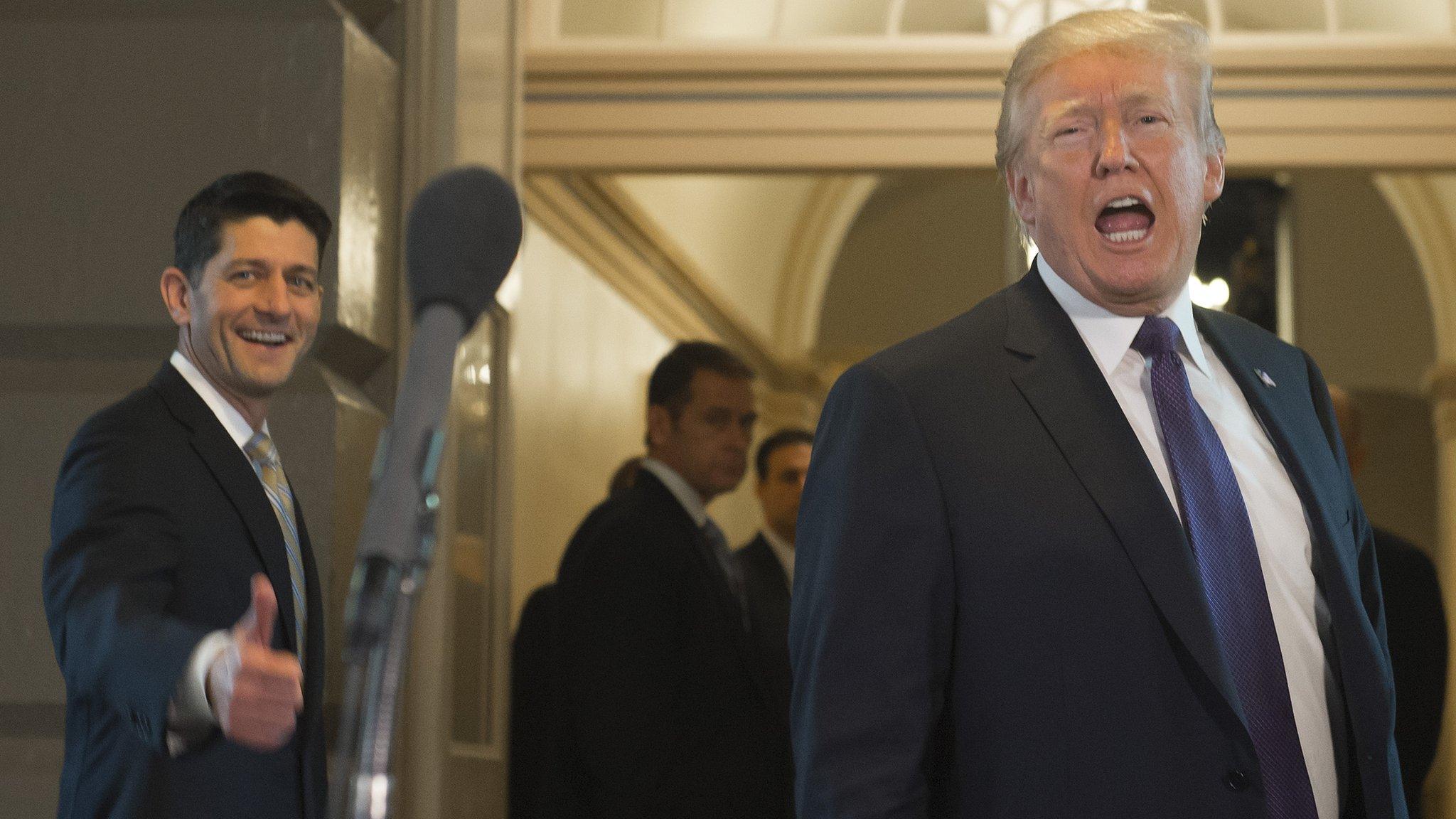US Republican tax plan: What you may have missed
- Published

Republicans are hurrying to pass tax reform - leaving uncertainty about some provisions in the bill
Republicans are rushing to pass the biggest revamp of the US tax code in decades.
And despite promises to simplify the code and eliminate special interest loopholes, the bill is packed with targeted goodies.
What makes it into a final compromise between the House bill, external and the Senate bill, external remains to be seen.
In the meantime, here are some provisions you may have missed as lawmakers rush to finalise a plan.
New drilling
Senator Lisa Murkowski attached a piece of legislation to the tax plan that would allow drilling in the Arctic National Wildlife Refuge, located in her home state of Alaska.

A man holds a sign during a 2005 rally to protect the Arctic National Wildlife Refuge from drilling
Securing Senator Murkowski's support for the bill was critical after she broke with Republicans earlier this year on a healthcare repeal effort.
Early education
The House and Senate bills allow families to save money for education in tax-privileged accounts for children "at any stage of development" - including those carried in the womb.
That's a provision designed to appeal to pro-life members of Congress.
Football fight
The bills would do away with a range of privileges enjoyed by sports teams, such as the tax-free status given to professional football leagues.
The House bill also strikes at tax-privileged financing for sports stadiums and a perk related to purchases of college athletics tickets.
Church power
Under current law, nonprofits - including churches and schools - cannot participate in political campaigns and retain their tax-free status.

Some groups, including evangelical churches, have chafed at that rule.
The House bill moves to reduce that risk, allowing nonprofits to make political statements, assuming they incur minimal expense and are made "in the ordinary course of the organisation's business".
Brew buzz
The Senate bill widens the range of wine producers eligible for tax credits, among other special rules for the beer and wine industry.
Production of kombucha - fermented tea that contains small amounts of alcohol - gets a special call-out for exemption from certain taxes, thanks to an amendment, external introduced by a Colorado senator.
Jet jockeying
The Senate bill would exempt firms that manage private jets from having to pay federal excise tax - one of the fees charged on ticket sales of commercial flights.
The Internal Revenue Service (IRS) in 2012 said private jet services were subject to the tax, but it has since been re-examining how to treat those payments.
Citrus squeeze
The Senate bill allows firms to expense "certain costs" of replanting citrus plants - a win for growers in states such as Florida, where crops have been marred by disease.

The citrus industry has been hurt by a disease that affects the trees
Florida lawmakers tried to secure this kind of perk in 2016 as a standalone measure.
Newman's Own
Current law limits how big a stake private foundations can hold in for-profit companies to discourage the creation of fake foundations.
The Senate bill removes those limits, provided the business meets certain requirements such as donating all profits to charity.
Politico reported, external the perk was a priority for Newman's Own, which sells food items including pasta sauce and salad dressing. It is just one example of the pet projects in the bill.
Teacher's pet
Under the Senate proposal, teachers can deduct up to $500 in classroom purchases - at least through 2025.
The perk was introduced in 2002 by Republican Senator Susan Collins, who holds a key vote in passing the bill. It was extended - and doubled - after its elimination in the House proposal.
Carried interest
During his campaign for president, Donald Trump pledged to eliminate this controversial benefit, which provides managers of companies - including private equity firms - a lower tax rate on money received for overseeing investments.
But the perk stands, although the House bill would require that the investment be held for at least three years to qualify for the lower rate, which was intended to encourage "long-term" capital investments.
- Published30 September 2017

- Published28 September 2017

- Published16 November 2017
